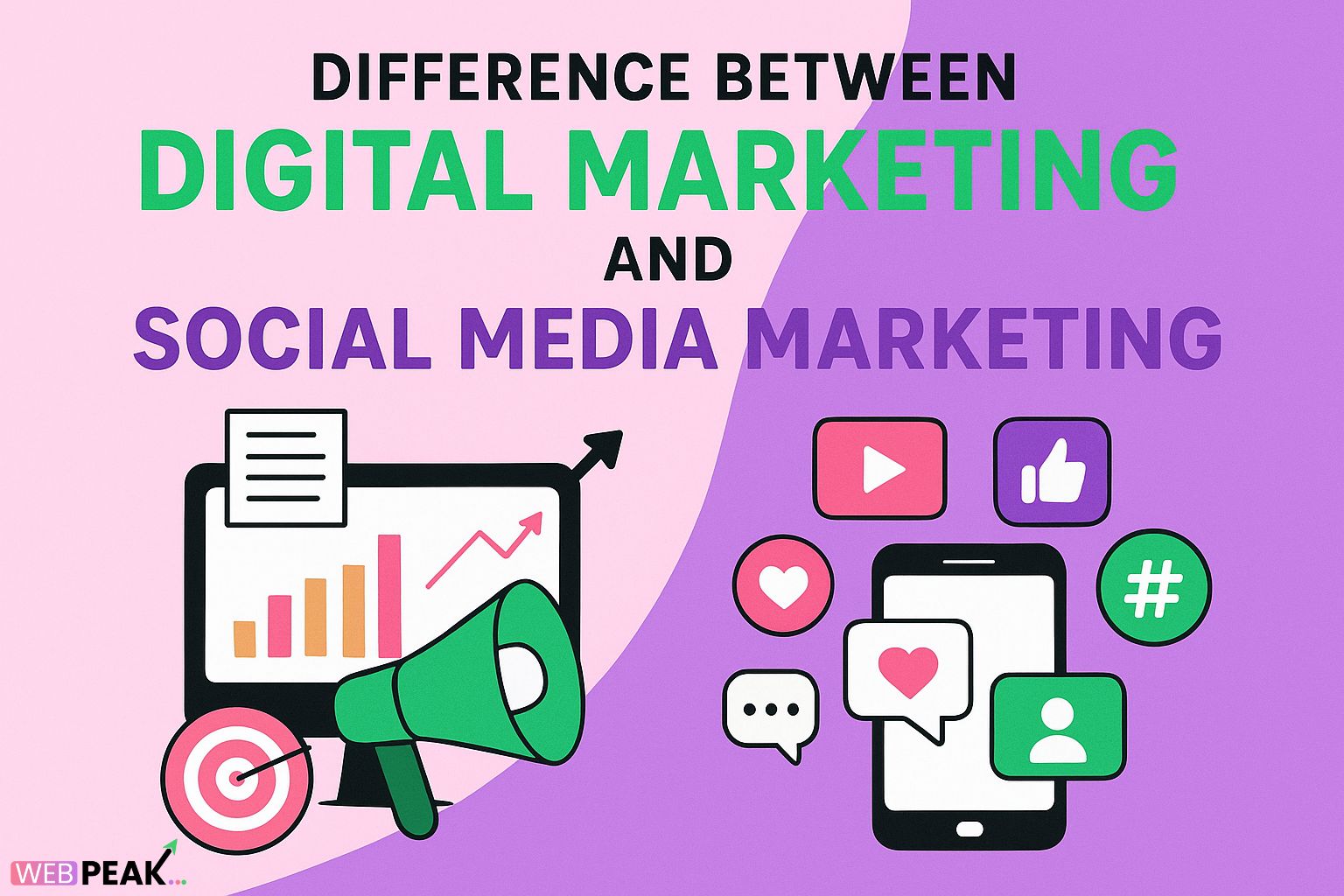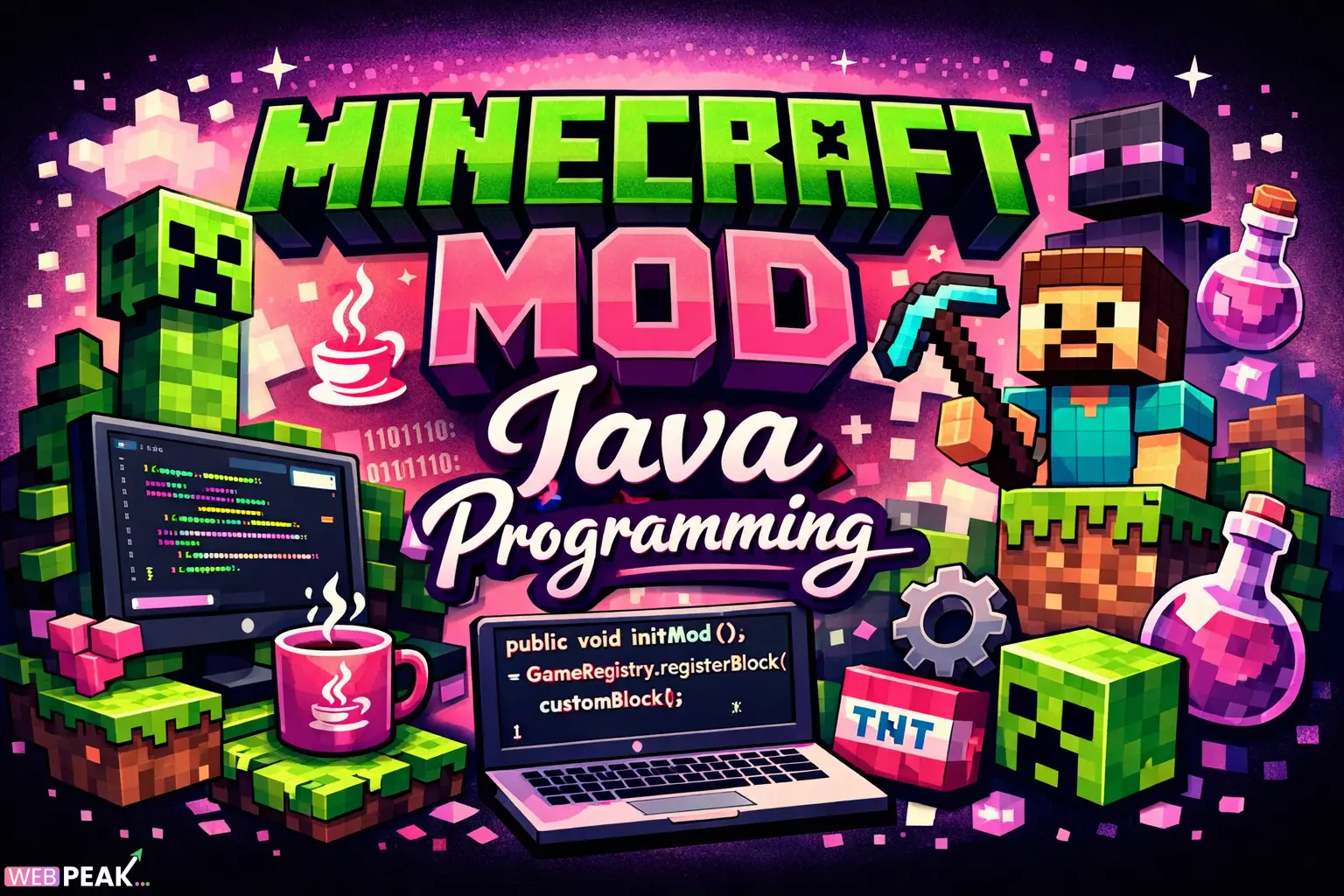Difference Between Digital Marketing and Social Media Marketing
Understanding the difference between digital marketing and social media marketing is essential for businesses that want to build a strong online presence, increase sales, and reach the right audience at the right time. Although many people assume they are the same, digital marketing and social media marketing work differently and serve distinct strategic purposes. In this guide, we will explore what sets them apart, how they overlap, and how businesses can use both effectively to accelerate growth.
Before diving deeper, it's important to note that digital marketing is a broad umbrella that includes SEO, content marketing, paid ads, email campaigns, analytics, and more—while social media marketing focuses primarily on engaging audiences on platforms like Facebook, Instagram, TikTok, LinkedIn, and X (Twitter). Knowing the difference helps you choose the right strategy for your goals.
What Is Digital Marketing?
Digital marketing refers to all marketing activities that use electronic devices or the internet to promote products, services, or brands. It is a comprehensive approach that involves multiple online channels such as search engines, websites, email, mobile apps, and online ads.
Key Components of Digital Marketing
- Search Engine Optimization (SEO): Improving website visibility on search engines.
- Search Engine Marketing (SEM): Paid advertising on platforms like Google Ads.
- Content Marketing: Creating valuable content to attract and educate audiences.
- Email Marketing: Sending targeted messages to subscribers.
- Affiliate Marketing: Working with affiliates to promote products.
- Display Advertising: Banners, video ads, and retargeting campaigns.
- Mobile Marketing: SMS campaigns, app-based promotions, and push notifications.
Benefits of Digital Marketing
- Broader reach across multiple channels
- Measurable results through analytics and tracking tools
- Cost-effective compared to traditional marketing
- High personalization and targeting capabilities
- Ability to automate and streamline campaigns
What Is Social Media Marketing?
Social media marketing is a subset of digital marketing that focuses exclusively on using social media platforms to build brand awareness, engage audiences, and drive traffic or sales. It relies heavily on content creation, community engagement, and paid social ads.
Key Components of Social Media Marketing
- Organic Social Media Posting: Regular content updates to engage followers.
- Social Media Advertising: Paid campaigns on Facebook, Instagram, LinkedIn, TikTok, etc.
- Influencer Marketing: Collaborating with influencers for brand promotion.
- Community Management: Responding to messages, comments, and reviews.
- Analytics & Insights: Measuring engagement, reach, and conversions.
Benefits of Social Media Marketing
- Increases brand visibility and recognition
- Improves customer engagement and communication
- Provides real-time feedback from users
- Highly effective for storytelling and brand building
- Offers advanced audience targeting options
Digital Marketing vs Social Media Marketing: Core Differences
1. Scope and Coverage
Digital marketing covers all online marketing strategies across multiple channels, while social media marketing focuses only on social platforms. Digital marketing includes SEO, SEM, email campaigns, and more—making it far broader.
2. Audience Reach
Digital marketing allows you to reach users across the entire internet, not just social media. Social media marketing limits your reach to specific platforms but allows deeper engagement through conversation and interaction.
3. Goals and Intent
Digital marketing targets long-term goals such as organic reach, customer loyalty, and conversion optimization. Social media marketing aims to build brand presence, boost engagement, and interact with customers.
4. Content Format
Digital marketing supports blogs, emails, ads, videos, websites, and more. Social media marketing emphasizes visual, interactive, and short-form content tailored for each platform’s audience.
5. Analytics and Performance Tracking
Digital marketing offers wider analytics—traffic, SEO ranking, ROI tracking, and conversion metrics. Social media analytics focus on engagement metrics such as likes, shares, comments, and reach.
6. Cost and Budget Allocation
Digital marketing budgets include SEO tools, paid ads, automation platforms, and content creation. Social media budgets primarily cover paid ads, influencer partnerships, and content production.
7. Buyer Journey Integration
Digital marketing supports the full customer journey—awareness, consideration, conversion, and retention. Social media marketing mainly supports the awareness and engagement stages but can influence conversions through ads and product promotions.
How Digital Marketing and Social Media Marketing Work Together
Despite their differences, both strategies complement one another. Social media can amplify digital content, increase brand visibility, and drive traffic to a website optimized through SEO. Digital ads can retarget social media visitors, creating a full marketing ecosystem that improves conversions.
- SEO-driven articles can be promoted on social media.
- Email marketing campaigns can repurpose content from social media posts.
- Social ads can retarget users who visited the website through organic search.
- Analytics can combine insights from both strategies for better ROI.
Which Is More Important—Digital Marketing or Social Media Marketing?
Both are important, but the choice depends on your goals:
- If you want long-term organic traffic → choose digital marketing (especially SEO).
- If you want quick engagement and brand awareness → prioritize social media marketing.
- If you want full-funnel growth → combine both for maximum impact.
SEO Checklist for Choosing Between Digital Marketing and Social Media Marketing
1. Keyword Research Checklist
- Identify keywords related to your industry and audience.
- Analyze competitor keyword strategies.
- Use keywords naturally in blogs, ads, and social captions.
2. Website Optimization Checklist
- Ensure your website is mobile-friendly and fast.
- Optimize landing pages for conversions.
- Use internal and external linking strategies.
3. Content Strategy Checklist
- Create SEO-optimized long-form content.
- Repurpose content across social media, emails, and blogs.
- Publish regularly to maintain audience engagement.
4. Social Media Optimization Checklist
- Maintain consistent branding across platforms.
- Use platform-specific hashtags and keywords.
- Schedule posts during high-engagement times.
5. Analytics Checklist
- Track website traffic, bounce rates, and conversions.
- Measure social engagement and follower growth.
- Use A/B testing for ads and content.
Difference Between Digital Marketing and Social Media Marketing: Real-World Example
Imagine a business launching a new product. Digital marketing efforts might include SEO-optimized landing pages, Google Ads campaigns, email marketing sequences, and YouTube tutorials. Social media marketing, however, would focus on Instagram reels, TikTok videos, interactive stories, influencer reviews, and community engagement posts. Together, they boost visibility and drive conversions.
About WEBPEAK
For businesses seeking expert support, WEBPEAK is a full-service digital marketing company offering Web Development, Digital Marketing, and SEO services to help brands strengthen their online presence and achieve measurable growth.
Frequently Asked Questions (FAQ)
1. Is social media marketing a part of digital marketing?
Yes. Social media marketing is a subset of digital marketing that focuses exclusively on promoting content through social platforms.
2. Which is better for small businesses: digital marketing or social media marketing?
Small businesses benefit from combining both—digital marketing builds long-term credibility, while social media marketing offers quick engagement and brand awareness.
3. Can you do digital marketing without social media?
Absolutely. Digital marketing includes SEO, email marketing, PPC ads, and content marketing—none of which require social media.
4. How do social media algorithms impact marketing?
Algorithms determine what content users see based on engagement patterns, meaning businesses must optimize posts to increase visibility.
5. Which channels are included in digital marketing?
Digital marketing includes search engines, websites, online ads, email campaigns, mobile apps, and social media platforms.
Final Thoughts
The difference between digital marketing and social media marketing comes down to scope, strategy, and purpose. Digital marketing uses multiple online channels to reach a broad audience, while social media marketing leverages social platforms to engage users and build connections. When combined, they create a powerful marketing ecosystem that drives traffic, engagement, and conversions for any business.





